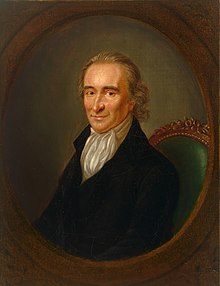
Universal basic income writers
Universal basic income (UBI) is discussed in many countries. This article summarizes the national and regional debates, where it takes place, and is a complement to the main article on the subject: universal basic income.
2 episodes
Episodes in this category also belong to the following categories:
HistoryPhilosophyFellows of the Royal SocietyOntologistsSocial philosophersPhilosophers of literatureTheorists on Western civilizationPhilosophers of historyWriters about activism and social changeEnlightenment philosophersMembers of the American Philosophical SocietyCritics of the Catholic ChurchEnglish essayistsEnglish male non-fiction writersWriters about religion and scienceAtheist philosophersPhilosophers of law20th-century atheistsNobel laureates in LiteraturePhilosophers of social science18th-century philosophersMetaphilosophersPhilosophers of economicsPhilosophers of mathematicsAristotelian philosophersEnglish people of Scottish descentHall of Fame for Great Americans inducteesLogiciansPhilosophers of lovePhilosophers of sexuality19th-century atheistsAmerican male non-fiction writersClassical liberalismCritics of work and the work ethicEmpiricistsAnalytic philosophersEnglish agnosticsPhilosophers of technology18th-century English male writers19th-century English writers19th-century male writersAnti-nationalistsBritish critics of religionsBritish philosophers of educationEnglish Nobel laureatesEnglish socialistsMembers of the Order of MeritMetaphysics writersRhetoric theoristsWriters about globalization18th-century English writers20th-century English philosophersAlumni of Trinity College, CambridgeAmerican political philosophersBritish ethicistsBritish philosophers of mindBritish political philosophersCritics of JudaismDeist philosophersEnglish inventorsEnglish libertariansEnglish people of Welsh descentEnglish political philosophersEnglish republicansEuropean democratic socialistsFreethought writersUtilitarians18th-century American writers, Founding Fathers of the United States, People of the American Enlightenment19th-century American philosophers19th-century English essayists19th-century English philosophers20th-century English mathematiciansAmerican deistsAmerican philosophers of cultureAmerican philosophers of educationAmerican philosophers of religionBritish consciousness researchers and theoristsBritish free speech activistsBritish historians of philosophyBritish philosophers of languageConsequentialistsEnglish logiciansEnglish political writersFellows of Trinity College, CambridgeGeorgistsJerusalem Prize recipientsLinguistic turnPresidents of the Aristotelian Society18th-century American male writers, American foreign policy writers18th-century English people19th-century American writers19th-century English mathematiciansAcademics of the London School of Economics, British philosophers of scienceAmerican nationalists, American religious skepticsAnti-monarchistsBritish atheism activistsBritish critics of ChristianityBritish deistsBritish philosophers of culture, English pacifistsBritish philosophers of logicBritish philosophers of religionDeputies to the French National ConventionEnglish anti-fascistsEnglish humanistsEnglish prisoners and detaineesEnglish scepticsFree love advocatesIntellectual historians, University of Chicago facultyNaturalized citizens of FrancePeople from MonmouthshirePolitical activists from PennsylvaniaRadicalsSecular humanistsSet theoristsUniversity of California, Los Angeles facultyWriters about communism
Bertrand Russell
Melvyn Bragg and his guests discuss the influential 20th-century British thinker Bertrand Russell, widely regarded as one of the founders of Analytical philosophy.
6 December 2012
Featuring: A. C. Grayling, Mike Beaney, Hilary Greaves
PhilosophyNobel laureates in LiteratureBritish philosophers of languageGeorgistsEnglish political writersFree love advocatesSet theoristsAristotelian philosophersWriters about religion and scienceJerusalem Prize recipientsFellows of Trinity College, CambridgeEnglish logiciansPhilosophers of mathematicsBritish historians of philosophyEmpiricistsOntologistsMetaphysics writersBritish political philosophersFellows of the Royal SocietyMetaphilosophersTheorists on Western civilizationBritish ethicistsPhilosophers of literatureBritish free speech activists20th-century English philosophersAnalytic philosophersEnglish humanistsRhetoric theoristsAtheist philosophersEnglish political philosophersEnglish anti-fascistsEnglish people of Scottish descentPhilosophers of historyEnglish agnostics20th-century atheistsConsequentialistsEnglish socialistsPhilosophers of social scienceBritish philosophers of religionPresidents of the Aristotelian SocietyLogiciansPhilosophers of lawPhilosophers of sexuality19th-century English mathematiciansCritics of work and the work ethicSecular humanistsPhilosophers of technologyPhilosophers of economicsWriters about globalizationBritish philosophers of educationBritish philosophers of culture, English pacifistsBritish philosophers of logicCritics of the Catholic ChurchPeople from MonmouthshireAlumni of Trinity College, CambridgeLinguistic turnPhilosophers of loveEuropean democratic socialistsBritish consciousness researchers and theoristsWriters about activism and social changeEnglish Nobel laureatesMembers of the Order of MeritEnglish prisoners and detaineesUtilitariansIntellectual historians, University of Chicago facultyEnglish scepticsBritish critics of ChristianityEnglish people of Welsh descentUniversal basic income writersBritish philosophers of mind19th-century English philosophersBritish critics of religionsAcademics of the London School of Economics, British philosophers of science19th-century atheistsUniversity of California, Los Angeles facultyAnti-nationalists20th-century English mathematiciansEnglish essayistsFreethought writersBritish atheism activistsWriters about communism19th-century English essayistsEnglish male non-fiction writersThomas Paine's Common Sense
Melvyn Bragg and guests discuss Thomas Paine's pamphlet Common Sense, which was published in 1776 and bolstered support for American independence.
21 January 2016
Featuring: Kathleen Burk, Nicholas Guyatt, Peter Thompson
History19th-century American writersEnglish libertarians19th-century American philosophersBritish deistsDeputies to the French National Convention18th-century philosophersAmerican male non-fiction writersClassical liberalismTheorists on Western civilizationAmerican deists19th-century male writersRadicalsSocial philosophers18th-century English writersAmerican political philosophers18th-century English peoplePolitical activists from PennsylvaniaNaturalized citizens of France18th-century American male writers, American foreign policy writersAmerican philosophers of cultureUniversal basic income writersHall of Fame for Great Americans inducteesAmerican philosophers of religionCritics of Judaism19th-century English writersDeist philosophersAmerican nationalists, American religious skepticsMembers of the American Philosophical SocietyEnlightenment philosophersEnglish inventorsWriters about activism and social changePhilosophers of historyEnglish republicans18th-century American writers, Founding Fathers of the United States, People of the American EnlightenmentAnti-monarchists18th-century English male writersAmerican philosophers of education

